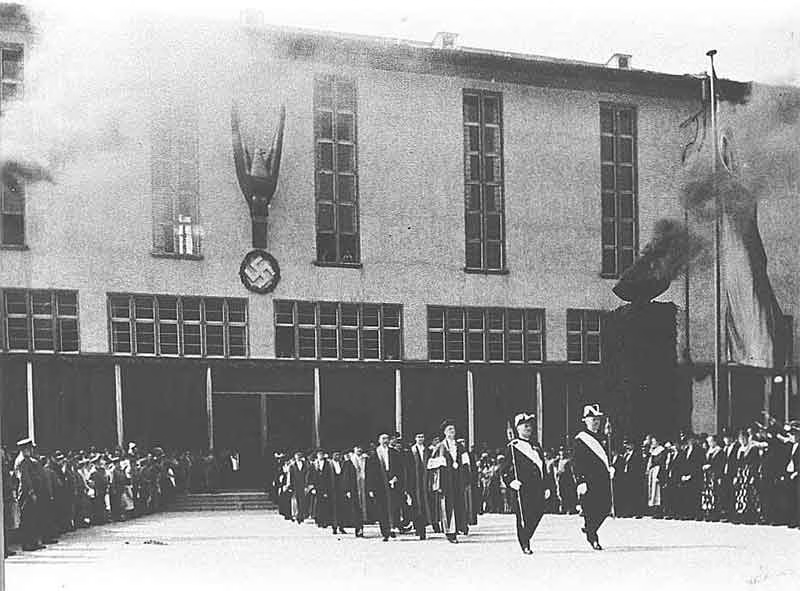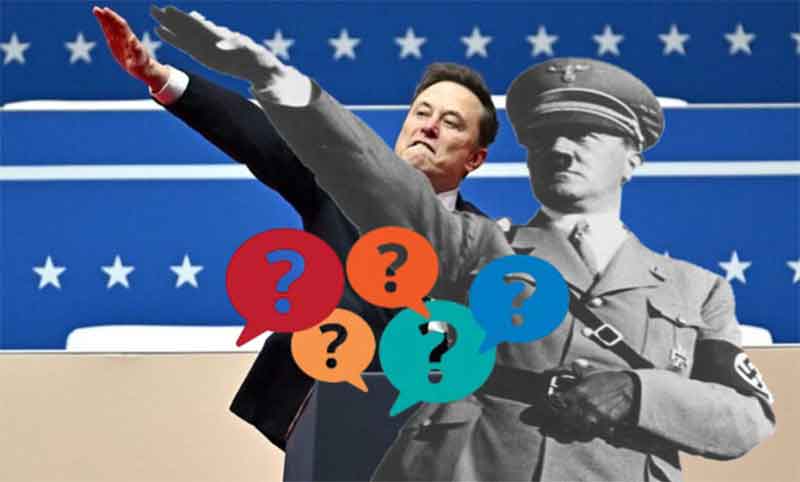
Germany’s new chancellor Friedrich Merz has a history, one that he does not like to highlight. His Opa or grandfather was a Nazi and it is this Nazi past that he is trying to keep extremely quiet about.
Yet, Friedrich Merz’s very own grandfather joined Hitler’s Nazi party – the NSDAP – himself and very willingly. Interestingly, his Opa became a Nazi member earlier than what was previously known.
Throughout Germany’s immediate post-Nazi years, ex-Nazis – and not so ex-Nazis (read: those who continued to believe in Nazi ideology well into the 1950s and 1960s) – tried everything to hide their Nazism, their Nazi party membership, their SS connection, and most of all, their Nazi crimes.
Today, we know that top-Nazi Josef Paul Sauvigny is the grandfather of chancellor Friedrich Merz. In the 1930s, Merz’s Nazi Opa made a “personal effort” to become a member of Hitler’s Nazi party.
As we know today, Merz’s Nazi Opa applied for membership in the Nazi Party earlier than formerly known. Despite all denials and sophisticated deceptions, eventually, the truth emerged.
Documents, that have been hidden in an archive but are available today, refute the earlier statement by Friedrich Merz to sell the fairy-tale that his grandfather had become a member of the Nazi party and as Merz rather improperly had claimed, “without his own intervention”.
Wrong, Herr Merz! Despite Merz’s best efforts, the reality is coming out, slowly and definitely too late.
There is the personal file of top-Nazi Josef Paul Sauvigny in Germany’s State Archive at North Rhine-Westphalia. The documents even hold the actual extract from Sauvigny’s NSDAP member file.
These files proved that top-Nazi Sauvigny became a member of the Nazi Party as early as May 1st, 1937. Merz’s Opa’s Nazi party number is: 425 82 18.
According to the personnel file in the state archive, Sauvigny submitted his Nazi party application for membership between May 1933 and February 1936.
The file also states that Merz’s grand-daddy “worked diligently“ as an SA storm-trooper (read: street thug, bullies and political killers). In short, he supported the Nazi party “as much as possible”.
Meanwhile, Josef Paul Sauvigny featured as mayor of the North Rhine-Westphalia town of Brilon from 1917 to 1937 – Hitler’s coup to power was in 1933.
In 2004 and long before becoming chancellor, Sauvigny’s grandson – Friedrich Merz – was the vice-president of Germany’s conservative party, the CDU.
In the year before that (in 2003), Merz did what his reactionary friends call, “the storming of the red town hall.” It was to eliminate a democratically elected progressive town hall – of Brilon.
With his anti-democratic battle cry of attacking the elected assembly in his local city, Merz had crossed the line. Ever since this anti-democratic incident, Merz has lost every single mayoral election in Brilon.
To his personal infuriation, Merz was never able to repeat what his Nazi Opa had done: become the mayor of Brilon.
Merz’s assault on the town hall was done by specifically alluding to the Nazi grandfather. Hitler’s SA or Sturmabteilung were not called storm troopers for no reason. In 2003, Merz and his troupe wanted to follow Hitler’s SA – implicitly or not.
The SA had stormed many German town halls in 1933 – the year of Hitler’s ascendency to power – to eliminate democracy.
Merz did all this by proudly referring to his Nazi grandfather in front of his party apparatchiks.
Before converting to Hitler’s Nazi ideology, Merz’s grand-dad was a member of the Catholic Centrist Party called Zentrum. Merz’s Nazi Opa was a member of the Zentrum until 1933 when he mutated into an out-and-out Nazi.
While a number of members of the Zentrum party joined the resistance against the Nazis – and many of them were persecuted by the Nazis – Merz’s Opa – Sauvigny – did the opposite: he actively joined the Nazi thugs.
Decades later and rather deceptively, Merz continued to claim that his grandfather had joined the Nazis “without any action of his own”. As we now know, this is not true.
Beyond that, there was automatism that converted catholic Zentrum members into brazen Nazis. Instead, it was said about Merz’s granddad that he supported the Nazi party “as much as possible”.
All of this contradicts Merz’s claims, ruses, and falsehoods. Next to all that, documents in Germany’s archives also show that on the issue of Nazi party membership, Merz’s grand-dad himself had “signed the application for admission”.
Sauvigny’s very own signature was a condition for admission to the Nazi party. He signed. Most likely, Merz’s grandfather also had to prove that he was of Aryan stock – with the infamous Ariernachweis.
Such an Ariernachweis was needed just to make sure that no Untermensch was able to sneak into the Nazi party – an ideologically zealous party obsessed with race.
It is reasonable to suggest that Merz knew about his family history all along. And this is precisely the reason as to why Merz has hardly ever spoken publicly about his grandfather’s Nazi past.
To hide this, Merz’s deceptions continued deep into a podcast of one of Germany’s most recognised weekly newspapers – Die Zeit.
This podcast appeared early in the year 2025, around the time of Germany’s national election campaign. In it, Merz even claimed that his grandfather had, “fallen into the abysses of Nazism”.
Obviously, Nazis just fall into Nazism! No action needed. Not even signing your membership application and not even providing an Aryan Certificate.
To the question of an interviewer that the grandfather’s Nazi story “must have been known in the family”, Merz simply replied, “yes, of course”.
This statement of Merz is remarkable. In the year 2004, Merz was still claiming that his grandfather was “not a Nazi”.
Today, this interview proves that Merz already knew what role his grandfather played in Hitler’s Nazi Reich. And lied about it. Yet, Merz continued to put his Nazi Opa in a positive light.
Unsurprisingly, Merz likes to avoid responding to journalists who inquire into his grandfather’s Nazi past.
Instead, Merz’s party – the CDU’s – press office claims, “from Mr Merz’s point of view, there have been no new findings about the Nazi involvement of his grandfather since 2004” – the year Merz was forced to admit the truth – that Merz’s Opa was a Nazi – for the first time.
Instead of admitting the inevitable truth, Merz goes on the attack. Merz had commented on the reporting of his Nazi Opa in 2004 that he was “disgusted” by journalists who shed light on his very own grandfather.
Merz was “disgusted” because the truth about his Nazi Opa started to emerge. Yet, he was not disgusted that his Opa was a faithful and diligent Nazi.
Around that time, Merz still insisted that his grandfather had “refused” to join Hitler’s Nazi party.
Merz’s wrongfully claimed that his Nazi Opa had refused to become a member of the Nazi Party. This is contradicted by the fact that a hand-signed Nazi party application form – signed by his Opa – does exist.
Meanwhile, Merz also claimed that his grandfather was simply “transferred” from Hitler’s street fighting thugs – the SA – to Hitler’s Nazi party “without any action”. As if, being an SA member wasn’t enough!
One is almost surprised not to find that Merz’s claims that his Nazi Opa suddenly realised, “Oh! I am a Nazi”, “I did not know that”, “The devil must have signed up for me!” and “I became a Nazi with no action required”.
It is striking that many of Merz’s statements about his Nazi-Opa were lifted from his grandfather’s very own statement which he had used to exonerate himself when forced to appear in front of the Denazification Commission, which was set up in the year 1946.
In other words, the conservative Merz followed the ideological lead of his SA-Opa when seeking to whitewash his Opa’s Nazism.
Meanwhile, it stands to reason that Merz has accepted the wrongful claims of a Nazi-grandfather for self-absolution.
What is important is that, as a loyal SA man, Nazi-Opa Sauvigny was rather “zealously engaged” in Hitler’s SA.
Worse, Nazi Sauvigny had been “fanatically active as an SA man from the very beginning” – at least that is what his own SA wrote about Merz’s Nazi Opa.
A document from February 1936 by the local Nazi Ortsgruppenleiter stated that Sauvigny’s application for Nazi party membership had been made after 1st May, 1933.
At the time when Merz’s Opa joined the Nazis, the Nazi party actually issued a stop to new admissions to the party.
It was done because millions of careerists wanted to join the party after the Nazis had taken over the government.
The ban was gradually lifted again in 1937. Yet, the local Nazi Ortsgruppenleiter noted about Sauvigny that “his relationship with the Nazi party is not bad and that he supports them whenever possible”. Merz’s Opa was a Nazi.
However, it is clear that Merz’s claim about his grandfather becoming a Nazi party member “without any help” cannot be sustained.
On 2nd July, 1937, a local newspaper – the Sauerländer Zeitung – wrote about Merz’s Nazi Opa, “his national [read: Nazi] attitude [allowed him to] always manage his office in the spirit of Nazism”.
Today, Friedrich Merz staunchly remains unwilling to publicly deal with his Nazi past.
Given Merz’s Nazi past, it is deeply worrying that, when journalists questioned Merz about his CDU party’s dealings with Germany’s neo-fascist AfD and about the lessons learned from Germany’s Nazi history, he was evasive.
Worse, when a journalist from the AP news agency asked Merz about his Nazi grandfather, Merz reacted with an insult saying, “I would be grateful if you would not use inappropriate comparisons from my family”.
On the 80th anniversary of the victory over Nazism, the taz newspaper has once again confronted the newly elected chancellor, Friedrich Merz with new findings about his Nazi grandfather. A request by the newspaper to his party’s press office remained unanswered. Merz’s political party prefers to remain silent.
All in all, the story of Merz’s Nazi grandfather isn’t surprising. Merz’s Nazi grand-daddy was one of millions of profiteers who had willingly and consciously joined and enjoyed the Nazi system.
Today, we know that Merz’s Nazi grandfather – even as mayor of Brilon – was an ardent supporter of Adolf Hitler.
Despite this, Merz continues to claim that his Nazi grandfather was not a Nazi by simply saying, “from what I know from my family, my grandfather was an impressive personality and a successful mayor”. It’s a classic: another Nazi past vanishes into thin air.
Some claim that his Nazi grandfather was Merz’s “greatest role model”. Tellingly for Germany, during the recent election campaign, Merz’s Nazi Opa hardly made an appearance.
Once again, Merz’s-Nazi-Opa scandal shows that there is hardly any Learning from the Germans asSusan Neiman claimed recently.
Instead, Germans, particularly those with a Nazi Opa, continue to evade and hide the truth about Nazism.
Meanwhile, Merz’s story of denial continues. Only very recently, Merz talked about his Nazi grandfather. It was in mid-January 2025. Merz spun the following story,
“I also got to know this grandfather …
he died in 1967 …
when I was 13 …
[he] as a centre politician”.
During Merz’s Nazi Opa’s tenure as mayor, two streets in Brilon were renamed into “Adolf-Hitler-Straße” and “Hermann-Göring-Straße”. Merz’s Opa and Nazi mayor delivered.
Today, questions are still asked whether Merz – with his camouflaging non-explanations about his Nazi grandfather – is contributing to the current political climate in Germany that praises Nazism.
On 21st of May, 2025, the TV-channel “MDR” reported that right-wing and Neo-Nazi violence in Germany has increased by 48%. On the same day, another Neo-Nazi terror squadron is uncovered in Germany.
Subscribe to Our Newsletter
Get the latest CounterCurrents updates delivered straight to your inbox.
Thomas Klikauer has over 800 publications (including 12 books) and writes regularly for BraveNewEurope (Western Europe), the Barricades (Eastern Europe), Buzzflash (USA), Counterpunch (USA), Countercurrents (India), Tikkun (USA), and ZNet (USA). One of his books is on Managerialism (2013).
Originally published in ZNetwork















































